Leadership and Technology: An SPSS Analysis of Employee Perception
VerifiedAdded on 2021/02/19
|7
|1520
|43
Homework Assignment
AI Summary
This assignment uses SPSS to analyze the impact of leadership styles and personality traits on employees' acceptance of new technology in the workplace. The analysis includes ANOVA and Chi-square tests to evaluate the influence of transformational and transactional leadership, as well as personality traits like openness to learning and embracing change, on employees' willingness to adopt new technologies. The findings suggest that while both leadership styles and personality traits play a role, the statistical analysis indicates the significance of different leadership styles (motivating and inspiring) and personality traits (openness to learning and adapting to change) in influencing employee perceptions and acceptance of new technologies. The assignment provides a comprehensive statistical analysis, including interpretations of the results, to support the conclusions regarding the impact of leadership and personality on technology adoption.
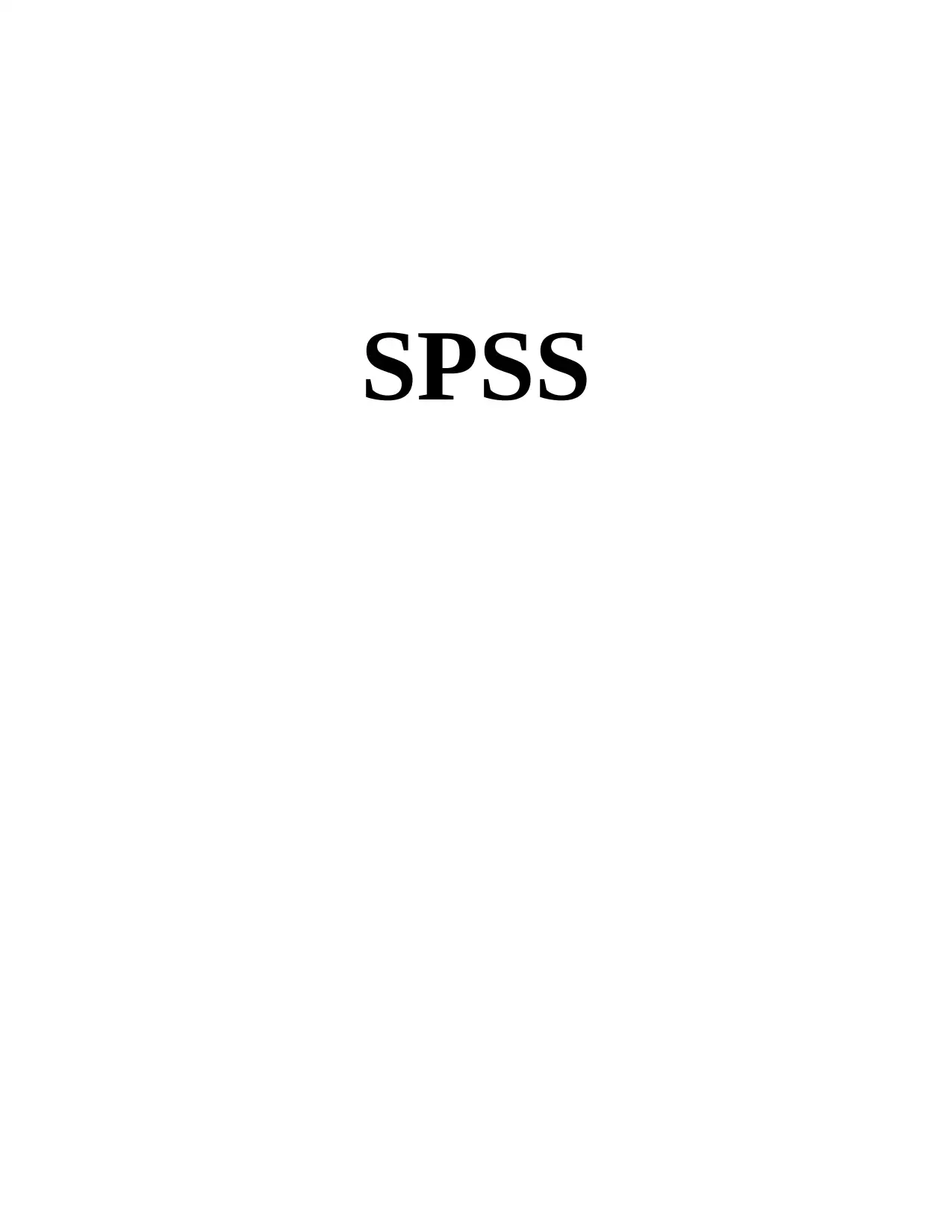
SPSS
Paraphrase This Document
Need a fresh take? Get an instant paraphrase of this document with our AI Paraphraser
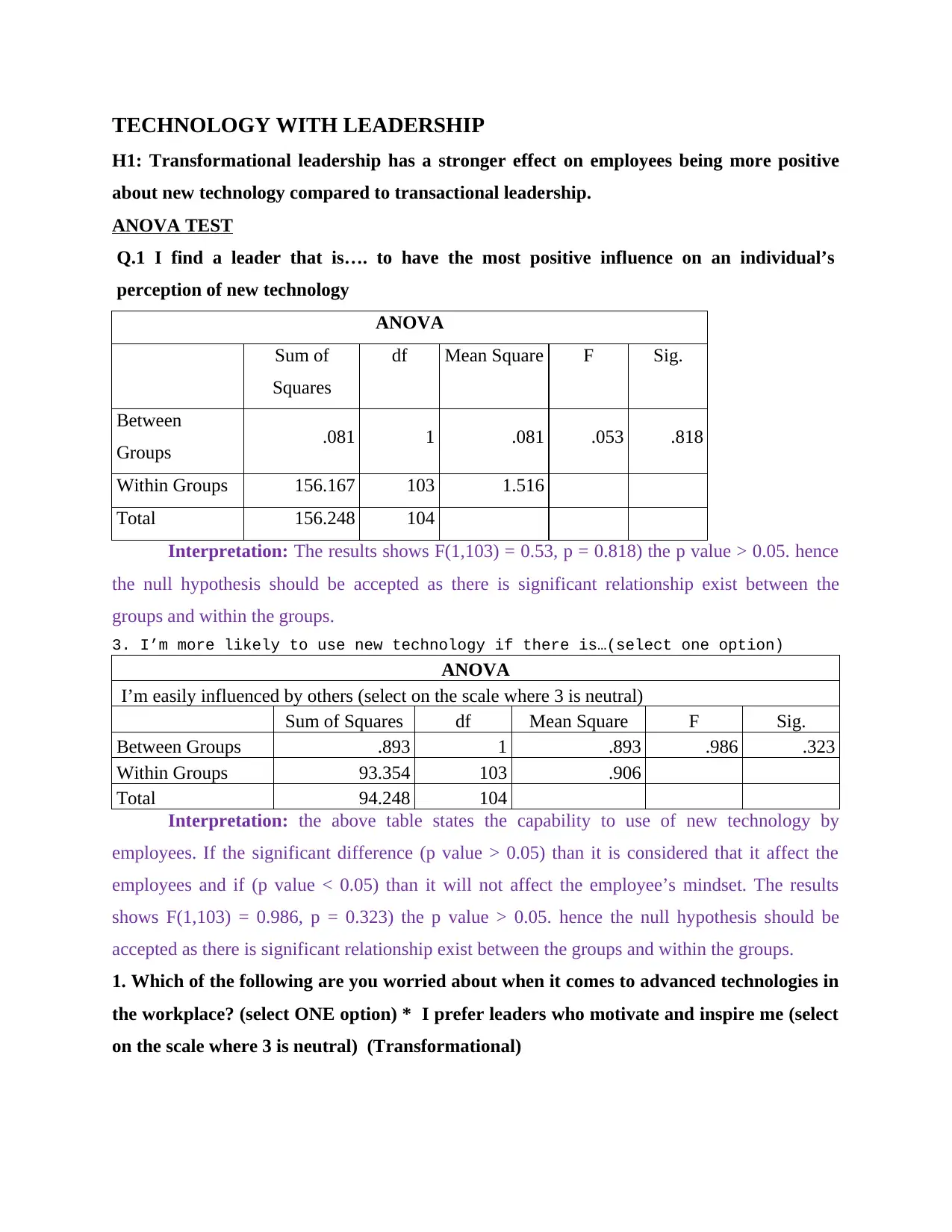
TECHNOLOGY WITH LEADERSHIP
H1: Transformational leadership has a stronger effect on employees being more positive
about new technology compared to transactional leadership.
ANOVA TEST
Q.1 I find a leader that is…. to have the most positive influence on an individual’s
perception of new technology
ANOVA
Sum of
Squares
df Mean Square F Sig.
Between
Groups .081 1 .081 .053 .818
Within Groups 156.167 103 1.516
Total 156.248 104
Interpretation: The results shows F(1,103) = 0.53, p = 0.818) the p value > 0.05. hence
the null hypothesis should be accepted as there is significant relationship exist between the
groups and within the groups.
3. I’m more likely to use new technology if there is…(select one option)
ANOVA
I’m easily influenced by others (select on the scale where 3 is neutral)
Sum of Squares df Mean Square F Sig.
Between Groups .893 1 .893 .986 .323
Within Groups 93.354 103 .906
Total 94.248 104
Interpretation: the above table states the capability to use of new technology by
employees. If the significant difference (p value > 0.05) than it is considered that it affect the
employees and if (p value < 0.05) than it will not affect the employee’s mindset. The results
shows F(1,103) = 0.986, p = 0.323) the p value > 0.05. hence the null hypothesis should be
accepted as there is significant relationship exist between the groups and within the groups.
1. Which of the following are you worried about when it comes to advanced technologies in
the workplace? (select ONE option) * I prefer leaders who motivate and inspire me (select
on the scale where 3 is neutral) (Transformational)
H1: Transformational leadership has a stronger effect on employees being more positive
about new technology compared to transactional leadership.
ANOVA TEST
Q.1 I find a leader that is…. to have the most positive influence on an individual’s
perception of new technology
ANOVA
Sum of
Squares
df Mean Square F Sig.
Between
Groups .081 1 .081 .053 .818
Within Groups 156.167 103 1.516
Total 156.248 104
Interpretation: The results shows F(1,103) = 0.53, p = 0.818) the p value > 0.05. hence
the null hypothesis should be accepted as there is significant relationship exist between the
groups and within the groups.
3. I’m more likely to use new technology if there is…(select one option)
ANOVA
I’m easily influenced by others (select on the scale where 3 is neutral)
Sum of Squares df Mean Square F Sig.
Between Groups .893 1 .893 .986 .323
Within Groups 93.354 103 .906
Total 94.248 104
Interpretation: the above table states the capability to use of new technology by
employees. If the significant difference (p value > 0.05) than it is considered that it affect the
employees and if (p value < 0.05) than it will not affect the employee’s mindset. The results
shows F(1,103) = 0.986, p = 0.323) the p value > 0.05. hence the null hypothesis should be
accepted as there is significant relationship exist between the groups and within the groups.
1. Which of the following are you worried about when it comes to advanced technologies in
the workplace? (select ONE option) * I prefer leaders who motivate and inspire me (select
on the scale where 3 is neutral) (Transformational)
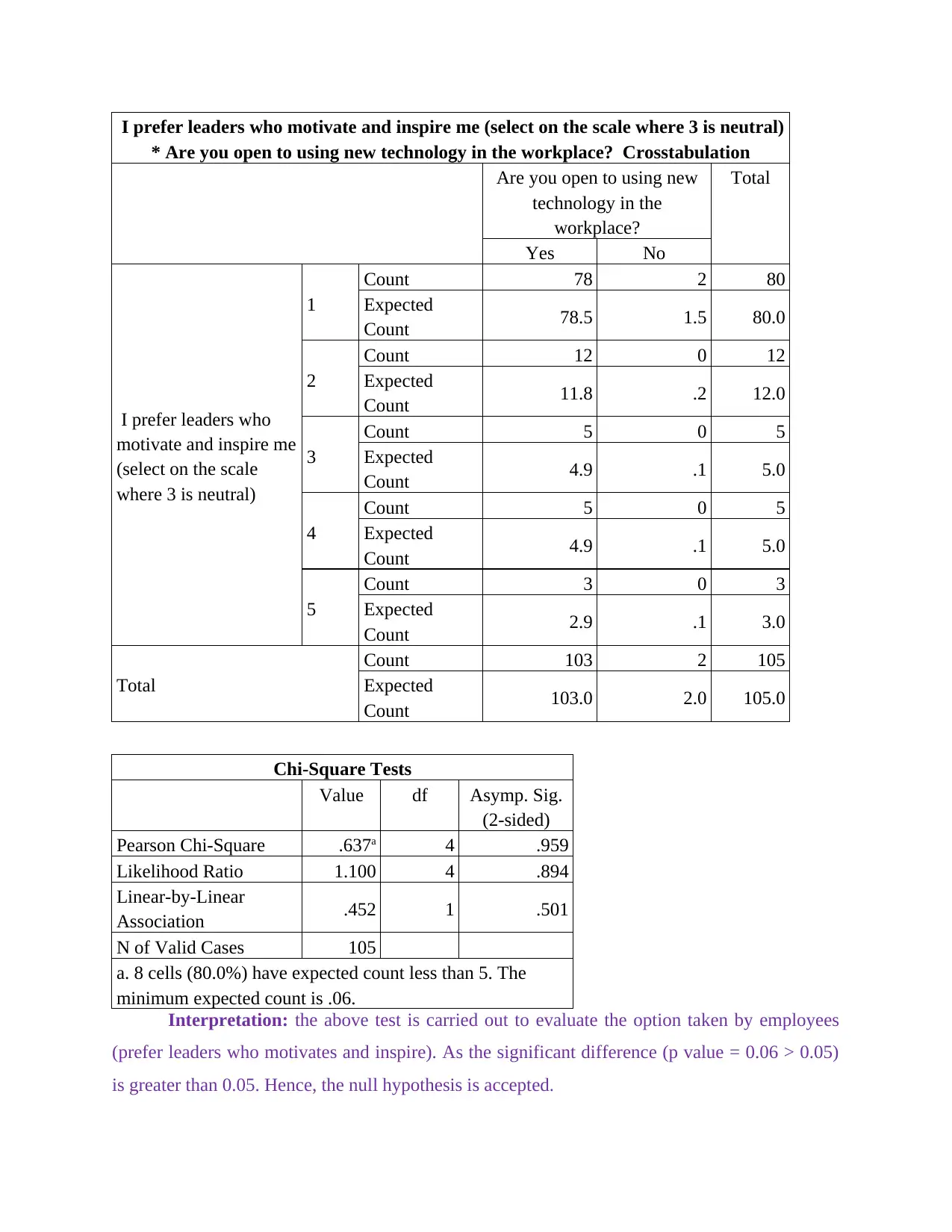
I prefer leaders who motivate and inspire me (select on the scale where 3 is neutral)
* Are you open to using new technology in the workplace? Crosstabulation
Are you open to using new
technology in the
workplace?
Total
Yes No
I prefer leaders who
motivate and inspire me
(select on the scale
where 3 is neutral)
1
Count 78 2 80
Expected
Count 78.5 1.5 80.0
2
Count 12 0 12
Expected
Count 11.8 .2 12.0
3
Count 5 0 5
Expected
Count 4.9 .1 5.0
4
Count 5 0 5
Expected
Count 4.9 .1 5.0
5
Count 3 0 3
Expected
Count 2.9 .1 3.0
Total
Count 103 2 105
Expected
Count 103.0 2.0 105.0
Chi-Square Tests
Value df Asymp. Sig.
(2-sided)
Pearson Chi-Square .637a 4 .959
Likelihood Ratio 1.100 4 .894
Linear-by-Linear
Association .452 1 .501
N of Valid Cases 105
a. 8 cells (80.0%) have expected count less than 5. The
minimum expected count is .06.
Interpretation: the above test is carried out to evaluate the option taken by employees
(prefer leaders who motivates and inspire). As the significant difference (p value = 0.06 > 0.05)
is greater than 0.05. Hence, the null hypothesis is accepted.
* Are you open to using new technology in the workplace? Crosstabulation
Are you open to using new
technology in the
workplace?
Total
Yes No
I prefer leaders who
motivate and inspire me
(select on the scale
where 3 is neutral)
1
Count 78 2 80
Expected
Count 78.5 1.5 80.0
2
Count 12 0 12
Expected
Count 11.8 .2 12.0
3
Count 5 0 5
Expected
Count 4.9 .1 5.0
4
Count 5 0 5
Expected
Count 4.9 .1 5.0
5
Count 3 0 3
Expected
Count 2.9 .1 3.0
Total
Count 103 2 105
Expected
Count 103.0 2.0 105.0
Chi-Square Tests
Value df Asymp. Sig.
(2-sided)
Pearson Chi-Square .637a 4 .959
Likelihood Ratio 1.100 4 .894
Linear-by-Linear
Association .452 1 .501
N of Valid Cases 105
a. 8 cells (80.0%) have expected count less than 5. The
minimum expected count is .06.
Interpretation: the above test is carried out to evaluate the option taken by employees
(prefer leaders who motivates and inspire). As the significant difference (p value = 0.06 > 0.05)
is greater than 0.05. Hence, the null hypothesis is accepted.
⊘ This is a preview!⊘
Do you want full access?
Subscribe today to unlock all pages.

Trusted by 1+ million students worldwide
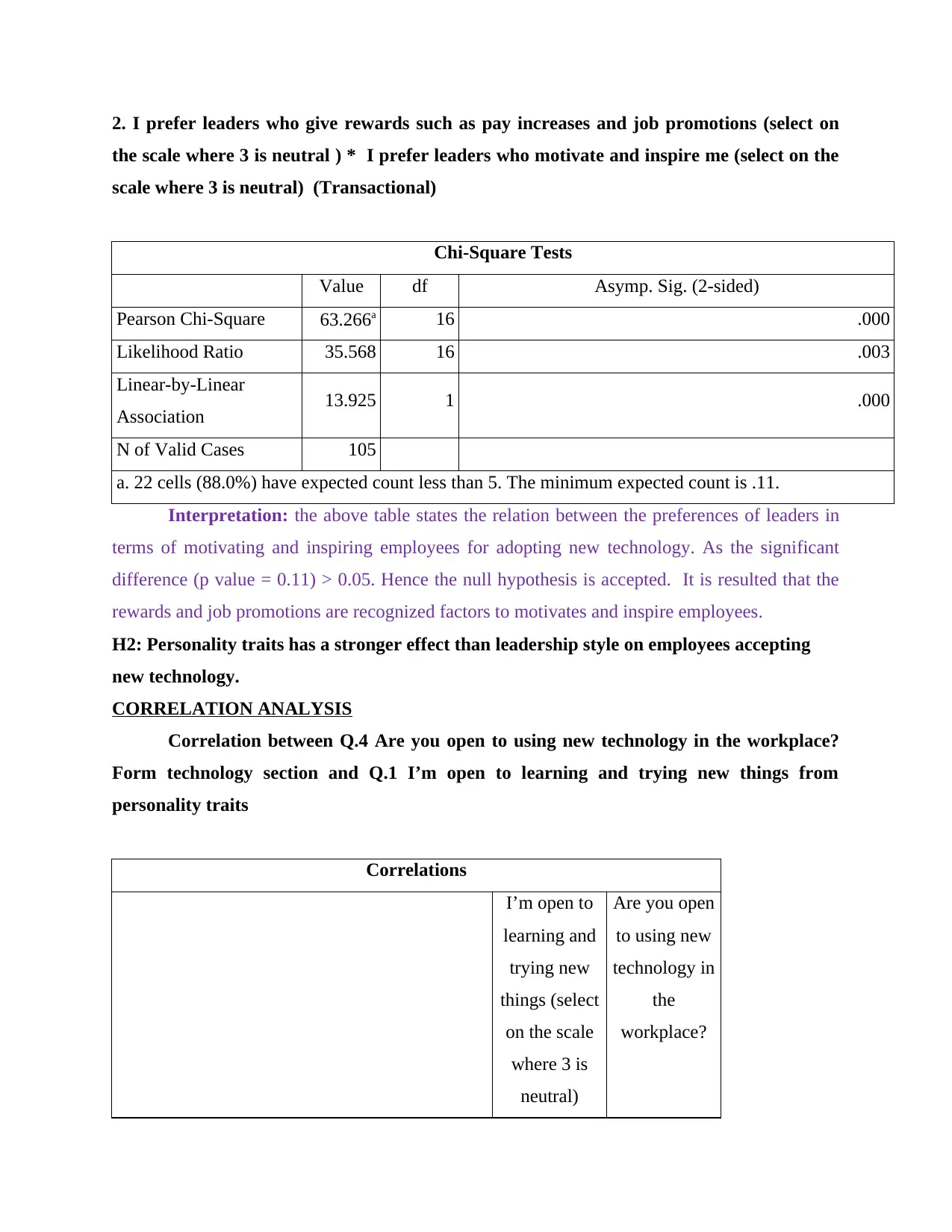
2. I prefer leaders who give rewards such as pay increases and job promotions (select on
the scale where 3 is neutral ) * I prefer leaders who motivate and inspire me (select on the
scale where 3 is neutral) (Transactional)
Chi-Square Tests
Value df Asymp. Sig. (2-sided)
Pearson Chi-Square 63.266a 16 .000
Likelihood Ratio 35.568 16 .003
Linear-by-Linear
Association 13.925 1 .000
N of Valid Cases 105
a. 22 cells (88.0%) have expected count less than 5. The minimum expected count is .11.
Interpretation: the above table states the relation between the preferences of leaders in
terms of motivating and inspiring employees for adopting new technology. As the significant
difference (p value = 0.11) > 0.05. Hence the null hypothesis is accepted. It is resulted that the
rewards and job promotions are recognized factors to motivates and inspire employees.
H2: Personality traits has a stronger effect than leadership style on employees accepting
new technology.
CORRELATION ANALYSIS
Correlation between Q.4 Are you open to using new technology in the workplace?
Form technology section and Q.1 I’m open to learning and trying new things from
personality traits
Correlations
I’m open to
learning and
trying new
things (select
on the scale
where 3 is
neutral)
Are you open
to using new
technology in
the
workplace?
the scale where 3 is neutral ) * I prefer leaders who motivate and inspire me (select on the
scale where 3 is neutral) (Transactional)
Chi-Square Tests
Value df Asymp. Sig. (2-sided)
Pearson Chi-Square 63.266a 16 .000
Likelihood Ratio 35.568 16 .003
Linear-by-Linear
Association 13.925 1 .000
N of Valid Cases 105
a. 22 cells (88.0%) have expected count less than 5. The minimum expected count is .11.
Interpretation: the above table states the relation between the preferences of leaders in
terms of motivating and inspiring employees for adopting new technology. As the significant
difference (p value = 0.11) > 0.05. Hence the null hypothesis is accepted. It is resulted that the
rewards and job promotions are recognized factors to motivates and inspire employees.
H2: Personality traits has a stronger effect than leadership style on employees accepting
new technology.
CORRELATION ANALYSIS
Correlation between Q.4 Are you open to using new technology in the workplace?
Form technology section and Q.1 I’m open to learning and trying new things from
personality traits
Correlations
I’m open to
learning and
trying new
things (select
on the scale
where 3 is
neutral)
Are you open
to using new
technology in
the
workplace?
Paraphrase This Document
Need a fresh take? Get an instant paraphrase of this document with our AI Paraphraser
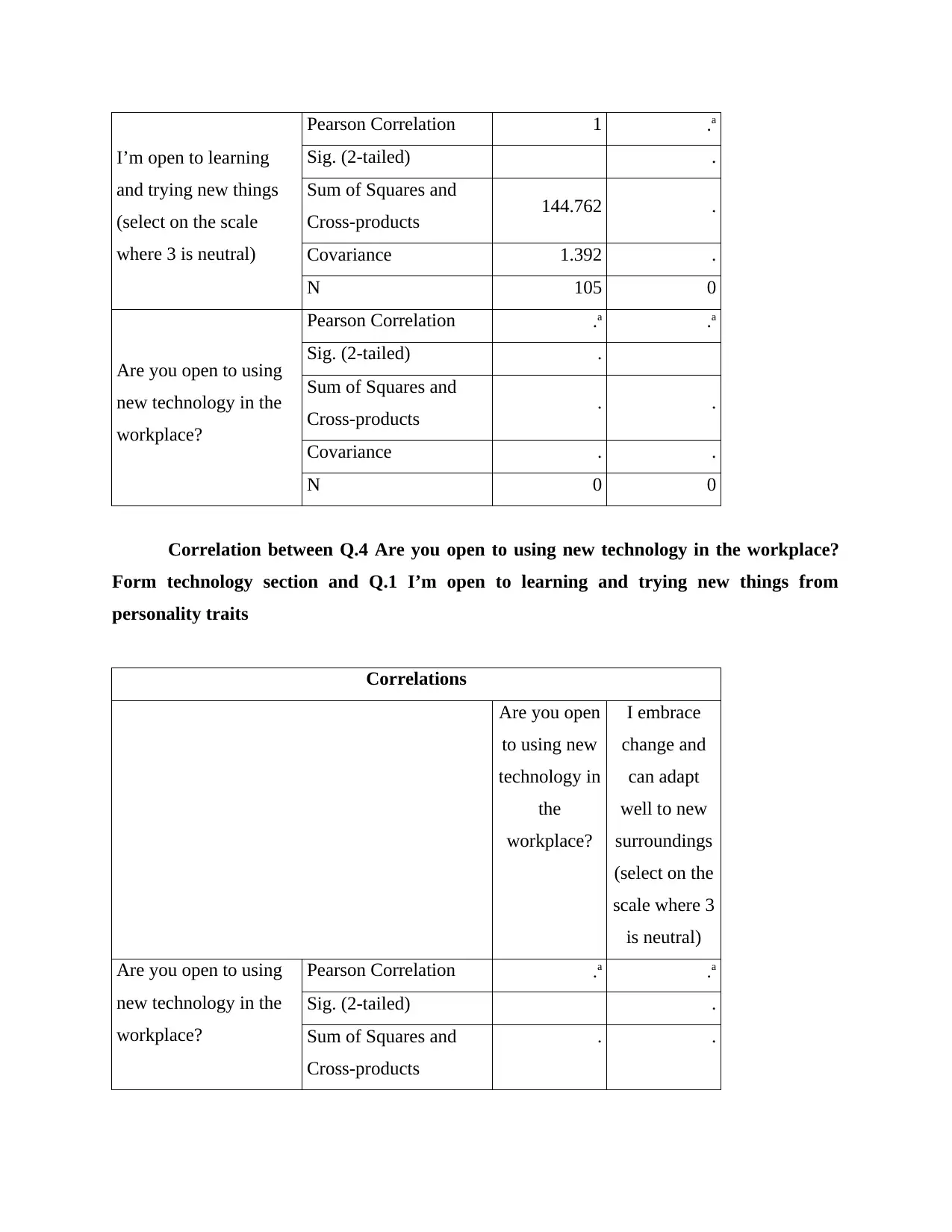
I’m open to learning
and trying new things
(select on the scale
where 3 is neutral)
Pearson Correlation 1 .a
Sig. (2-tailed) .
Sum of Squares and
Cross-products 144.762 .
Covariance 1.392 .
N 105 0
Are you open to using
new technology in the
workplace?
Pearson Correlation .a .a
Sig. (2-tailed) .
Sum of Squares and
Cross-products . .
Covariance . .
N 0 0
Correlation between Q.4 Are you open to using new technology in the workplace?
Form technology section and Q.1 I’m open to learning and trying new things from
personality traits
Correlations
Are you open
to using new
technology in
the
workplace?
I embrace
change and
can adapt
well to new
surroundings
(select on the
scale where 3
is neutral)
Are you open to using
new technology in the
workplace?
Pearson Correlation .a .a
Sig. (2-tailed) .
Sum of Squares and
Cross-products
. .
and trying new things
(select on the scale
where 3 is neutral)
Pearson Correlation 1 .a
Sig. (2-tailed) .
Sum of Squares and
Cross-products 144.762 .
Covariance 1.392 .
N 105 0
Are you open to using
new technology in the
workplace?
Pearson Correlation .a .a
Sig. (2-tailed) .
Sum of Squares and
Cross-products . .
Covariance . .
N 0 0
Correlation between Q.4 Are you open to using new technology in the workplace?
Form technology section and Q.1 I’m open to learning and trying new things from
personality traits
Correlations
Are you open
to using new
technology in
the
workplace?
I embrace
change and
can adapt
well to new
surroundings
(select on the
scale where 3
is neutral)
Are you open to using
new technology in the
workplace?
Pearson Correlation .a .a
Sig. (2-tailed) .
Sum of Squares and
Cross-products
. .
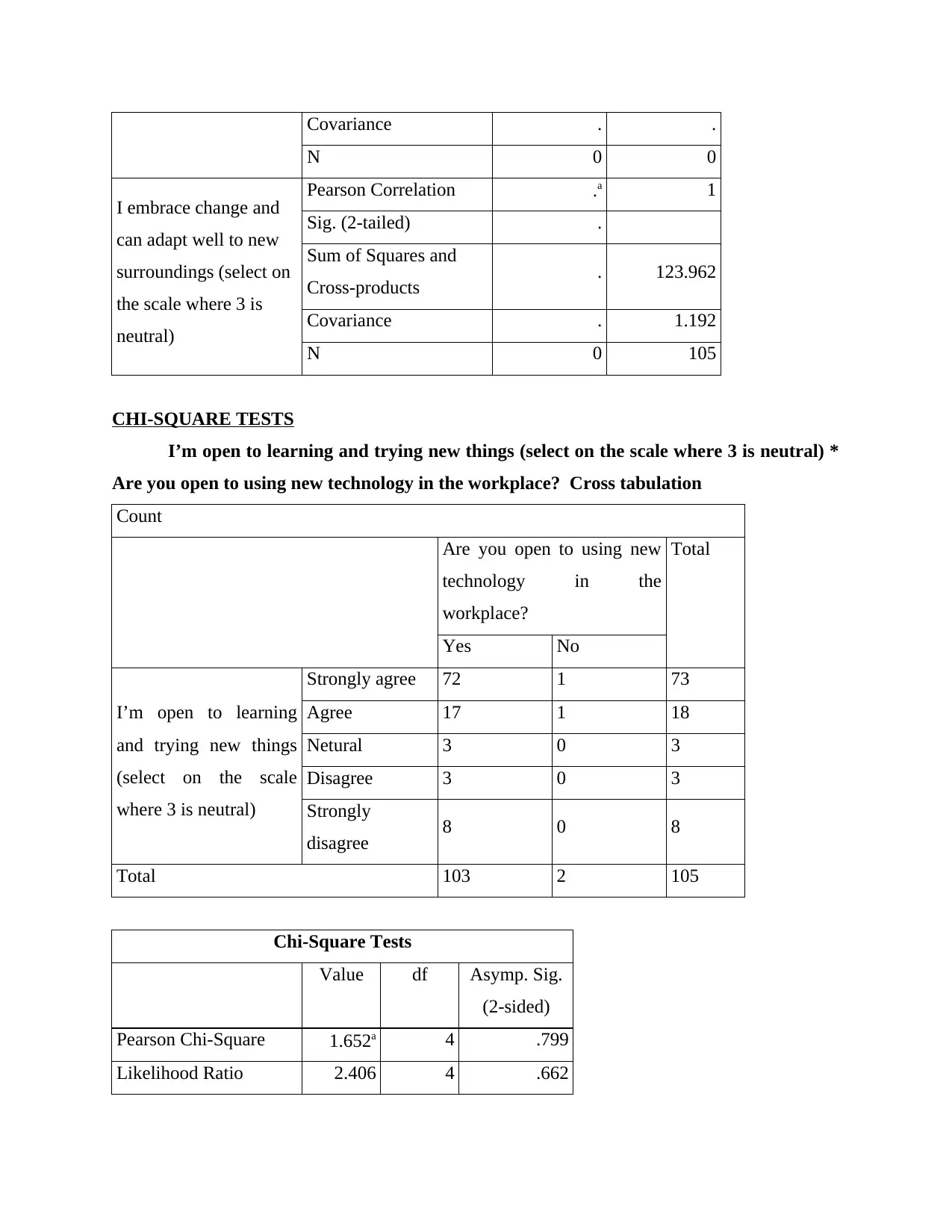
Covariance . .
N 0 0
I embrace change and
can adapt well to new
surroundings (select on
the scale where 3 is
neutral)
Pearson Correlation .a 1
Sig. (2-tailed) .
Sum of Squares and
Cross-products . 123.962
Covariance . 1.192
N 0 105
CHI-SQUARE TESTS
I’m open to learning and trying new things (select on the scale where 3 is neutral) *
Are you open to using new technology in the workplace? Cross tabulation
Count
Are you open to using new
technology in the
workplace?
Total
Yes No
I’m open to learning
and trying new things
(select on the scale
where 3 is neutral)
Strongly agree 72 1 73
Agree 17 1 18
Netural 3 0 3
Disagree 3 0 3
Strongly
disagree 8 0 8
Total 103 2 105
Chi-Square Tests
Value df Asymp. Sig.
(2-sided)
Pearson Chi-Square 1.652a 4 .799
Likelihood Ratio 2.406 4 .662
N 0 0
I embrace change and
can adapt well to new
surroundings (select on
the scale where 3 is
neutral)
Pearson Correlation .a 1
Sig. (2-tailed) .
Sum of Squares and
Cross-products . 123.962
Covariance . 1.192
N 0 105
CHI-SQUARE TESTS
I’m open to learning and trying new things (select on the scale where 3 is neutral) *
Are you open to using new technology in the workplace? Cross tabulation
Count
Are you open to using new
technology in the
workplace?
Total
Yes No
I’m open to learning
and trying new things
(select on the scale
where 3 is neutral)
Strongly agree 72 1 73
Agree 17 1 18
Netural 3 0 3
Disagree 3 0 3
Strongly
disagree 8 0 8
Total 103 2 105
Chi-Square Tests
Value df Asymp. Sig.
(2-sided)
Pearson Chi-Square 1.652a 4 .799
Likelihood Ratio 2.406 4 .662
⊘ This is a preview!⊘
Do you want full access?
Subscribe today to unlock all pages.

Trusted by 1+ million students worldwide
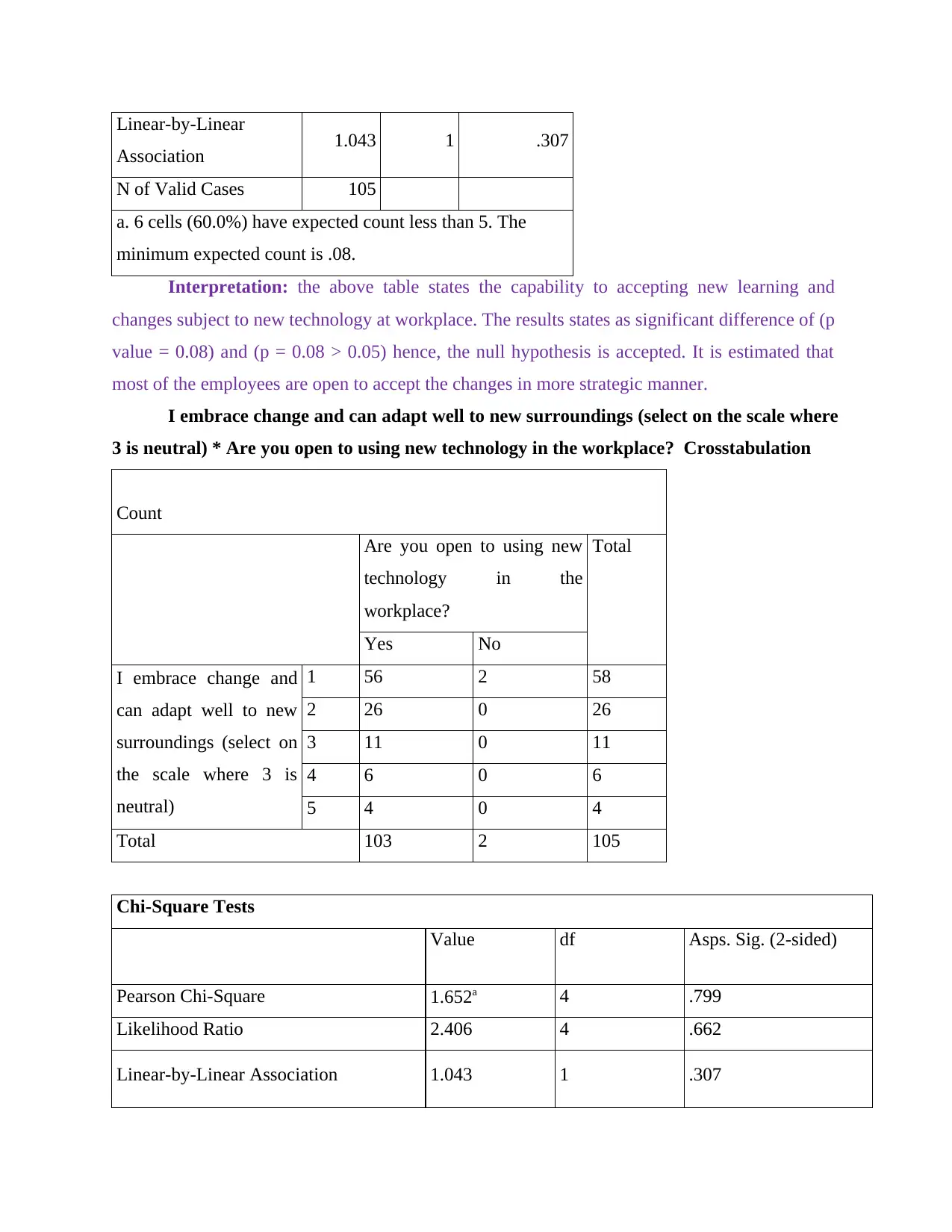
Linear-by-Linear
Association 1.043 1 .307
N of Valid Cases 105
a. 6 cells (60.0%) have expected count less than 5. The
minimum expected count is .08.
Interpretation: the above table states the capability to accepting new learning and
changes subject to new technology at workplace. The results states as significant difference of (p
value = 0.08) and (p = 0.08 > 0.05) hence, the null hypothesis is accepted. It is estimated that
most of the employees are open to accept the changes in more strategic manner.
I embrace change and can adapt well to new surroundings (select on the scale where
3 is neutral) * Are you open to using new technology in the workplace? Crosstabulation
Count
Are you open to using new
technology in the
workplace?
Total
Yes No
I embrace change and
can adapt well to new
surroundings (select on
the scale where 3 is
neutral)
1 56 2 58
2 26 0 26
3 11 0 11
4 6 0 6
5 4 0 4
Total 103 2 105
Chi-Square Tests
Value df Asps. Sig. (2-sided)
Pearson Chi-Square 1.652a 4 .799
Likelihood Ratio 2.406 4 .662
Linear-by-Linear Association 1.043 1 .307
Association 1.043 1 .307
N of Valid Cases 105
a. 6 cells (60.0%) have expected count less than 5. The
minimum expected count is .08.
Interpretation: the above table states the capability to accepting new learning and
changes subject to new technology at workplace. The results states as significant difference of (p
value = 0.08) and (p = 0.08 > 0.05) hence, the null hypothesis is accepted. It is estimated that
most of the employees are open to accept the changes in more strategic manner.
I embrace change and can adapt well to new surroundings (select on the scale where
3 is neutral) * Are you open to using new technology in the workplace? Crosstabulation
Count
Are you open to using new
technology in the
workplace?
Total
Yes No
I embrace change and
can adapt well to new
surroundings (select on
the scale where 3 is
neutral)
1 56 2 58
2 26 0 26
3 11 0 11
4 6 0 6
5 4 0 4
Total 103 2 105
Chi-Square Tests
Value df Asps. Sig. (2-sided)
Pearson Chi-Square 1.652a 4 .799
Likelihood Ratio 2.406 4 .662
Linear-by-Linear Association 1.043 1 .307
1 out of 7
Related Documents
Your All-in-One AI-Powered Toolkit for Academic Success.
+13062052269
info@desklib.com
Available 24*7 on WhatsApp / Email
![[object Object]](/_next/static/media/star-bottom.7253800d.svg)
Unlock your academic potential
Copyright © 2020–2025 A2Z Services. All Rights Reserved. Developed and managed by ZUCOL.





